‘Hey’ is a new series where we catch up with interesting people from Plymouth and the surrounding area. We discover what they are about and what they are up to.
Next up in the series is Hannah Sloggett from Nudge Community Builders.
Nudge Community Builders is on a mission to create lasting change in surprising and enterprising ways to build a strong local community and economy. Their vision is to make Union Street a street the whole world loves again.
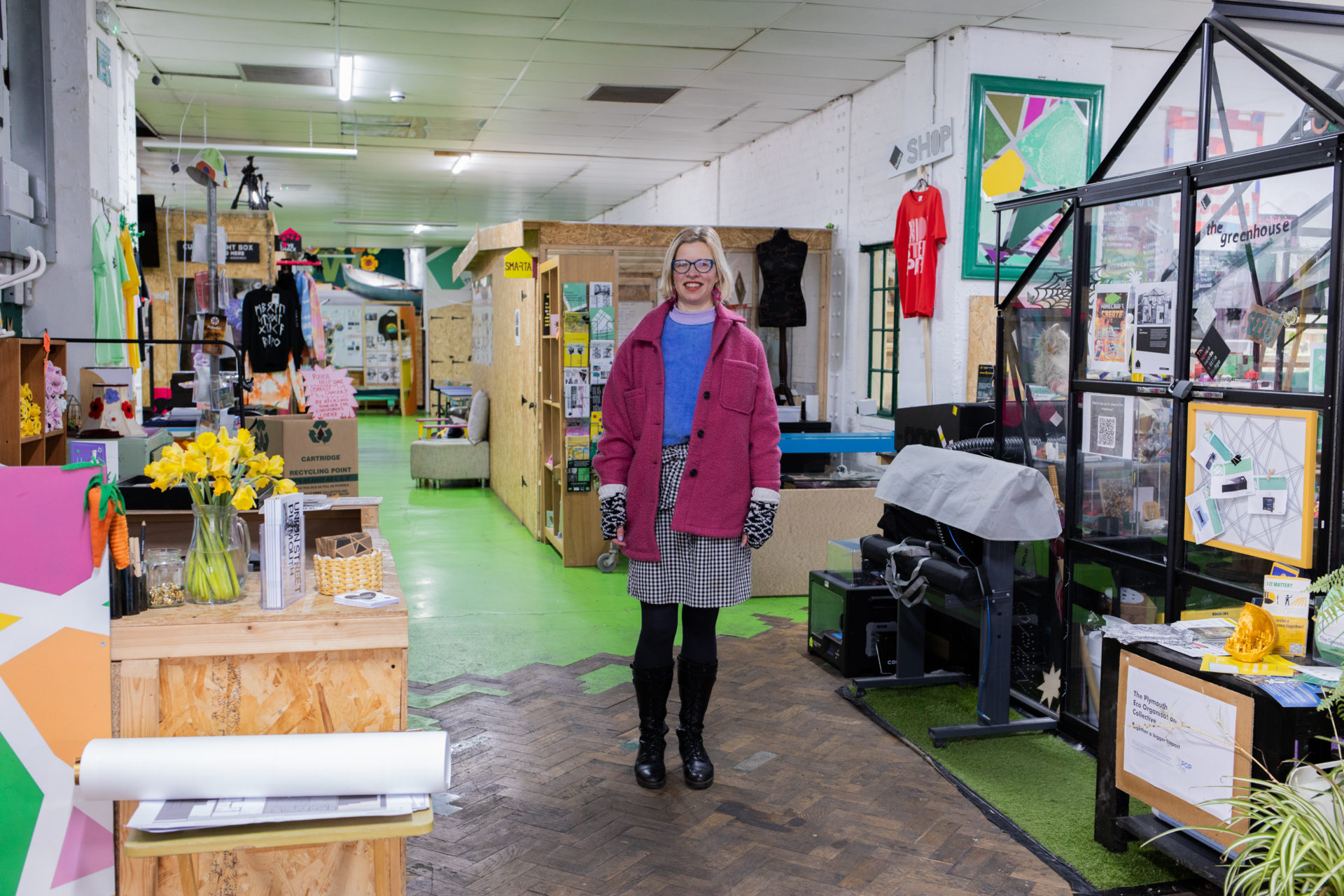
How are you?
I’m good, thank you. It’s a really important question, isn’t it? Especially if you’re prepared to listen. Quite a lot of people go, ‘how are you?’ and then just, move on. They don’t actually want to know. So this bench here is normally outside The Plot when we’re open and we sit with people just passing by – those little checking in conversations that happen are really important.
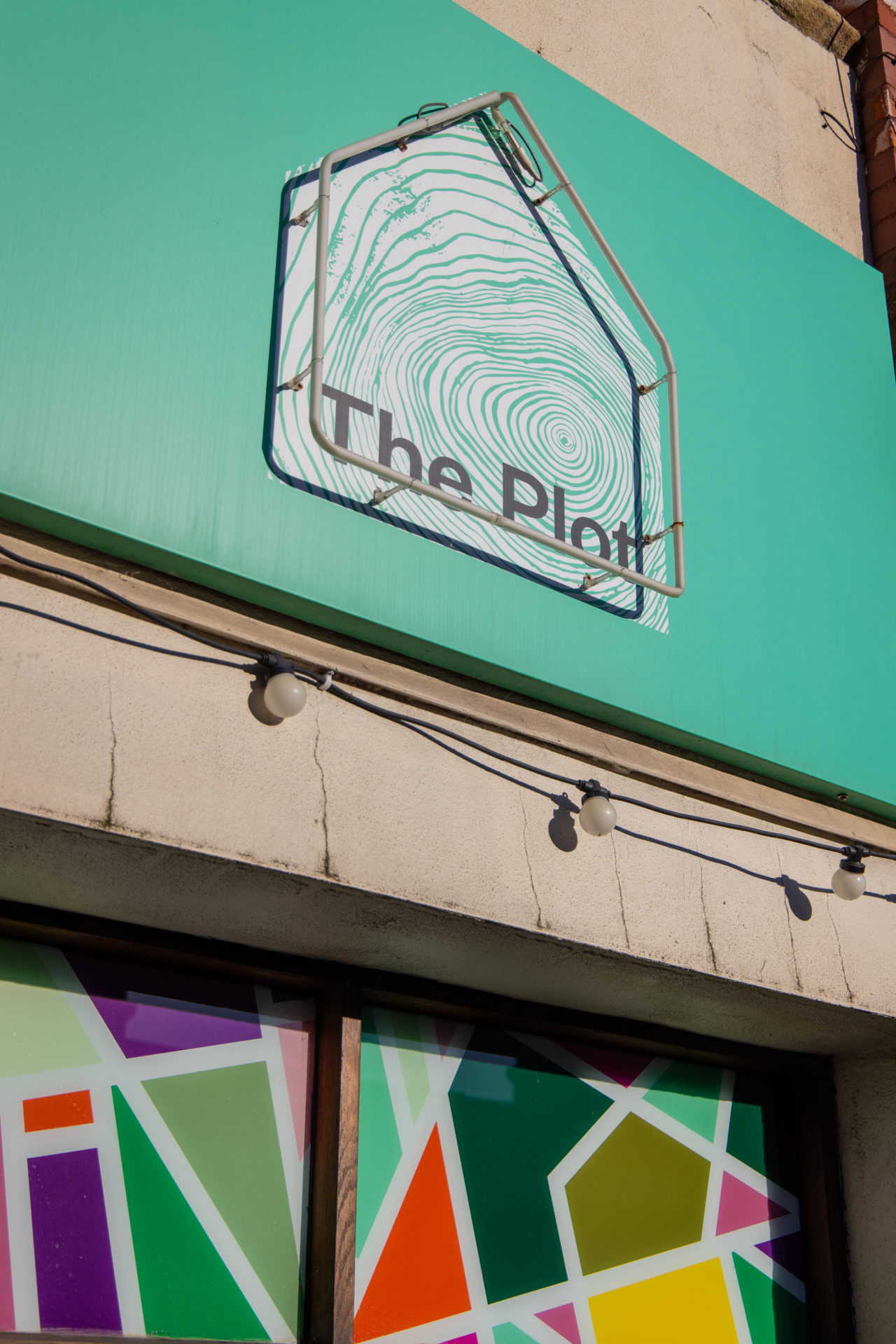
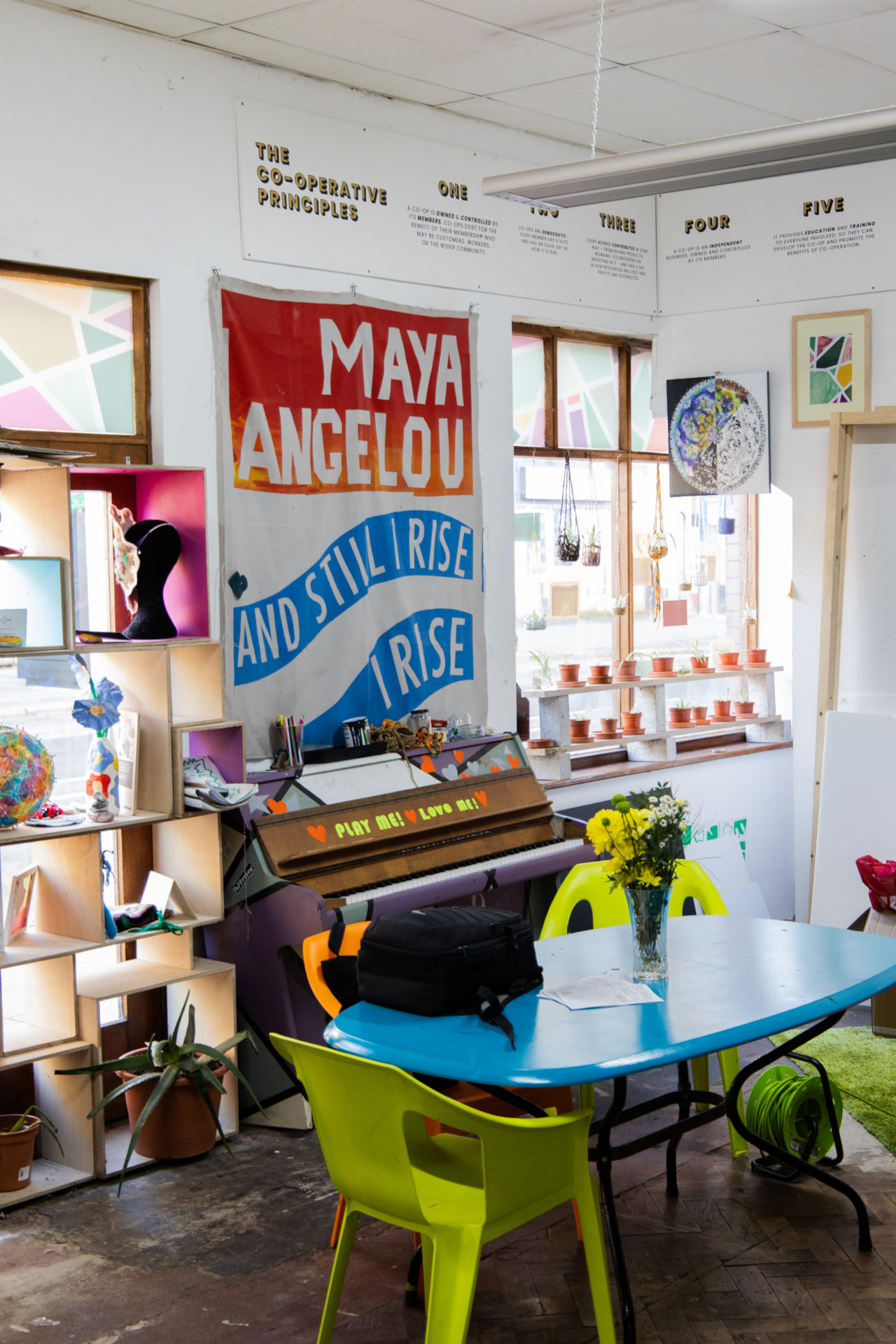
How did Nudge come about?
Nudge came about because we had been doing the Union Street Party as volunteers and every year, people came out on the street and asked why no one was doing anything about the empty buildings. Because you see them in a different way. It’s heads down on Union Street, isn’t it? But when the street is closed, you experience it in a completely different way, and people are looking up and around and going, what is actually happening? And we did as well. We were all local people and we were like ‘yeah, this actually isn’t okay.’
We slowly started to unpick why that was. We started off with putting pictures and artwork up on different empty buildings and getting to know who owns them and things like that. Gradually we just wanted to make more and more of a difference and could see our route to doing that.
We took on Union Corner, and that was really a massive education in how the economy works, because we didn’t realise how much a community organisation can trigger change around them, that actually creates economic benefit that doesn’t stay in the area. The landowner at Union Corner, owns properties all around, so then he was renting those for more too.
We were like, right, okay, actually, it’s the ownership that is really important to create lasting change and the ability to manage an area in a long term way for local benefit. And that got us on that route, so we figured out what we needed to get in place to be able to own buildings and that became Nudge.
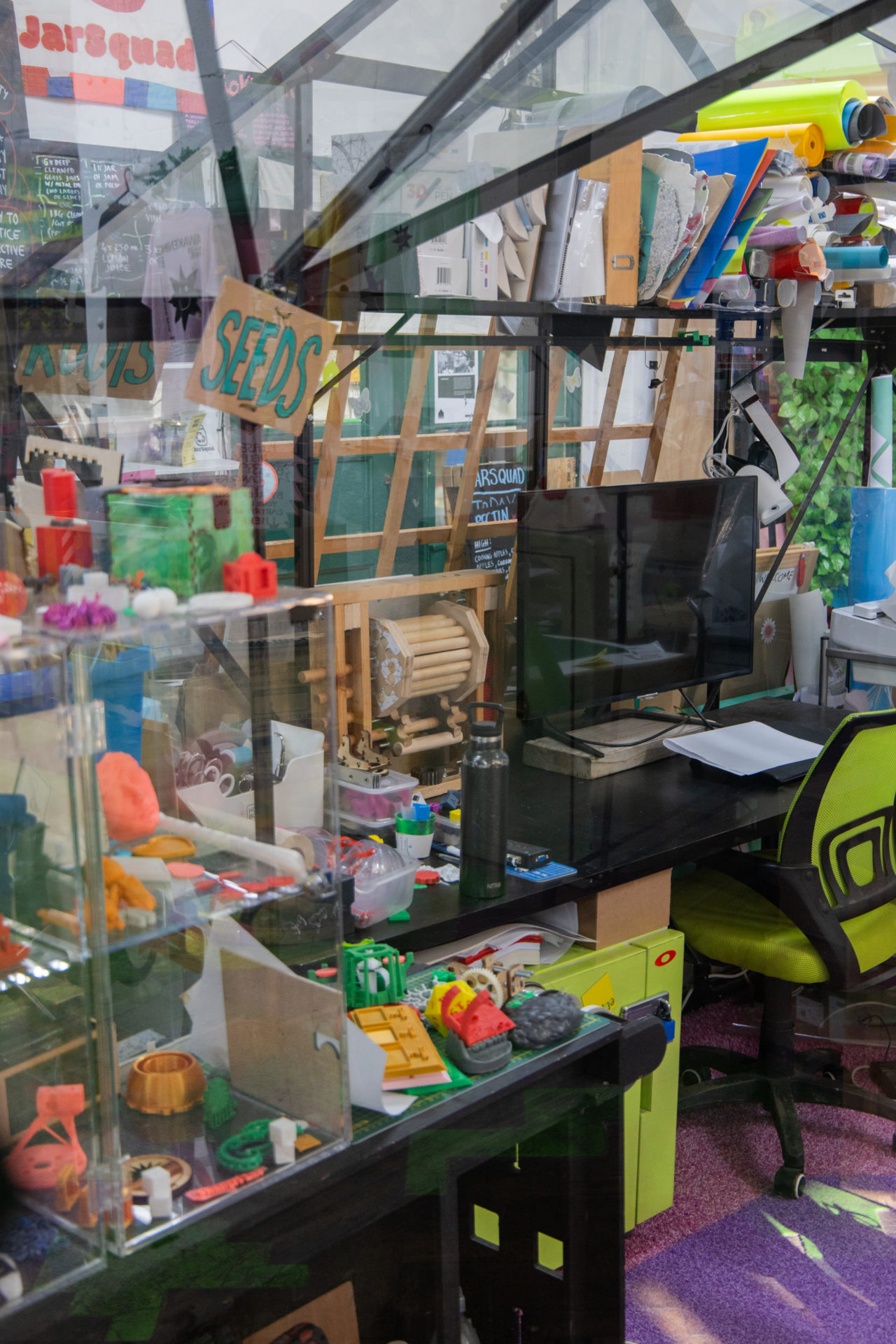
What is the main mission statement of Nudge Community?
Nudge is a community benefit society owned and run by local people that are bringing about lasting change in Union Street for local benefit in fun and interesting ways. It’s not just the standard way to bring a building back into use. The process is as important as the actual change that we’re making.
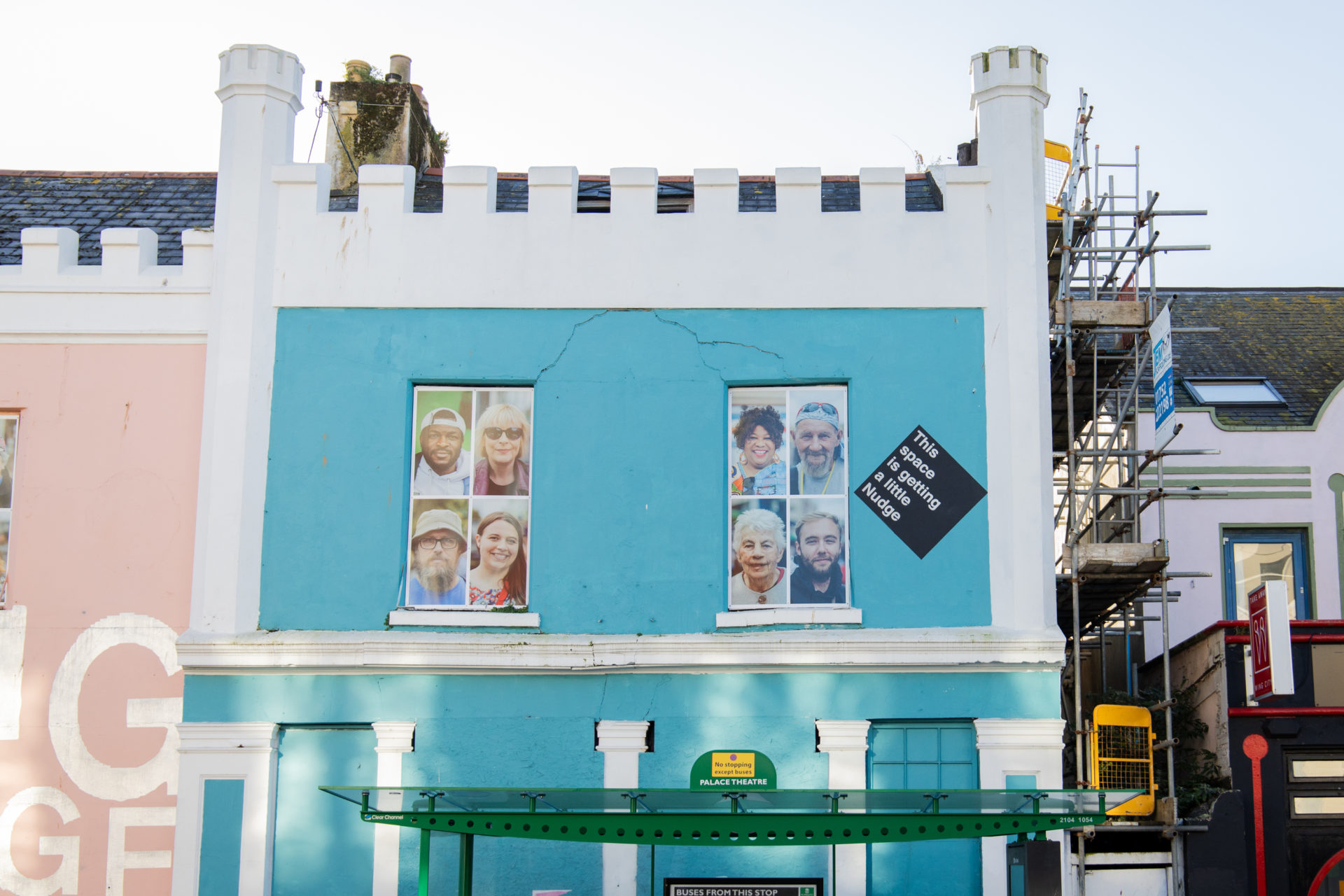
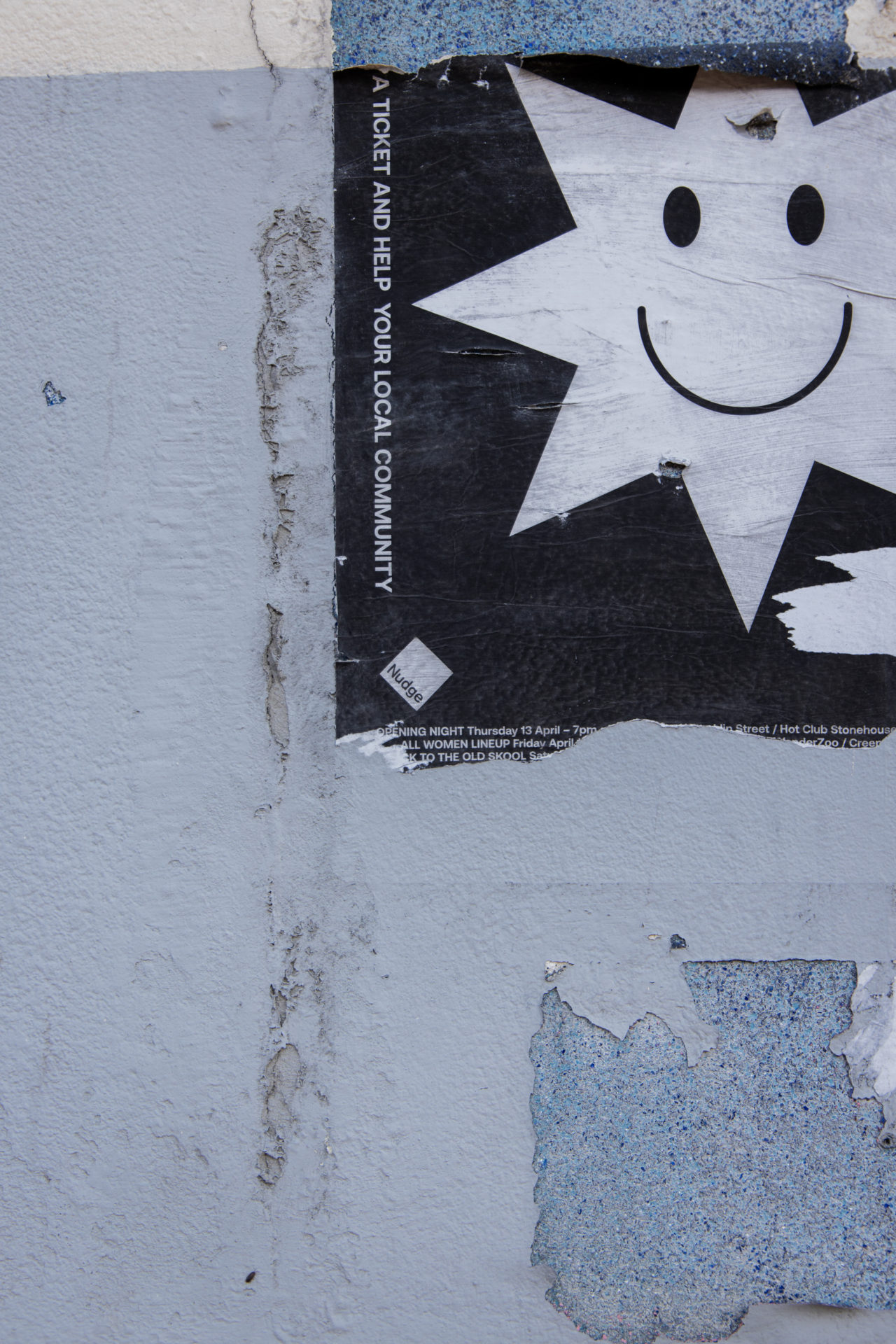
What’s the favourite thing about your job?
It’s fun. It’s really hard. I think probably the main thing is the ability to feel that you can make change in brave ways that can make more difference. I’m not in an organisation where I need to ask permission for everything or where things have always been done in a certain way. That is scary and freeing at the same time. And I’ve discovered I’m naturally quite a high risk taker and so I feel really lucky that Wendy and I have created something that can take those risks and do some of the things that we’ve imagined.
There are a lot of tricky things though. It’s weird because obviously no one on the outside sees all the stuff that we could have done or that we missed out on. There are buildings we’ve missed out on, there’s funding that we haven’t got, there’s all of that sort of stuff that could have been.
And the number of people with real urgent need is always increasing, we are not a service but we support people in lots of ways. That’s the real juggle – I might be sat here working on a million pound funding application and someone walks in needing food, and so you’re switching from one thing that feels important, but actually, the person in front of me is more important at that moment.
So we are really tough on ourselves around some of that. This area is really disadvantaged in a lot of ways, value for money feels like something very different here than it might be in other places so we work really hard to make sure funding we do secure is spent in ways that make a real lasting difference. And the accountability, because me and Wendy both live locally, is off the scale compared to a national developer. I’ll be in Aldi and it’ll be like, oh, you said you’re going to do this, when’s it going to happen? So it can be pretty intense in that way.
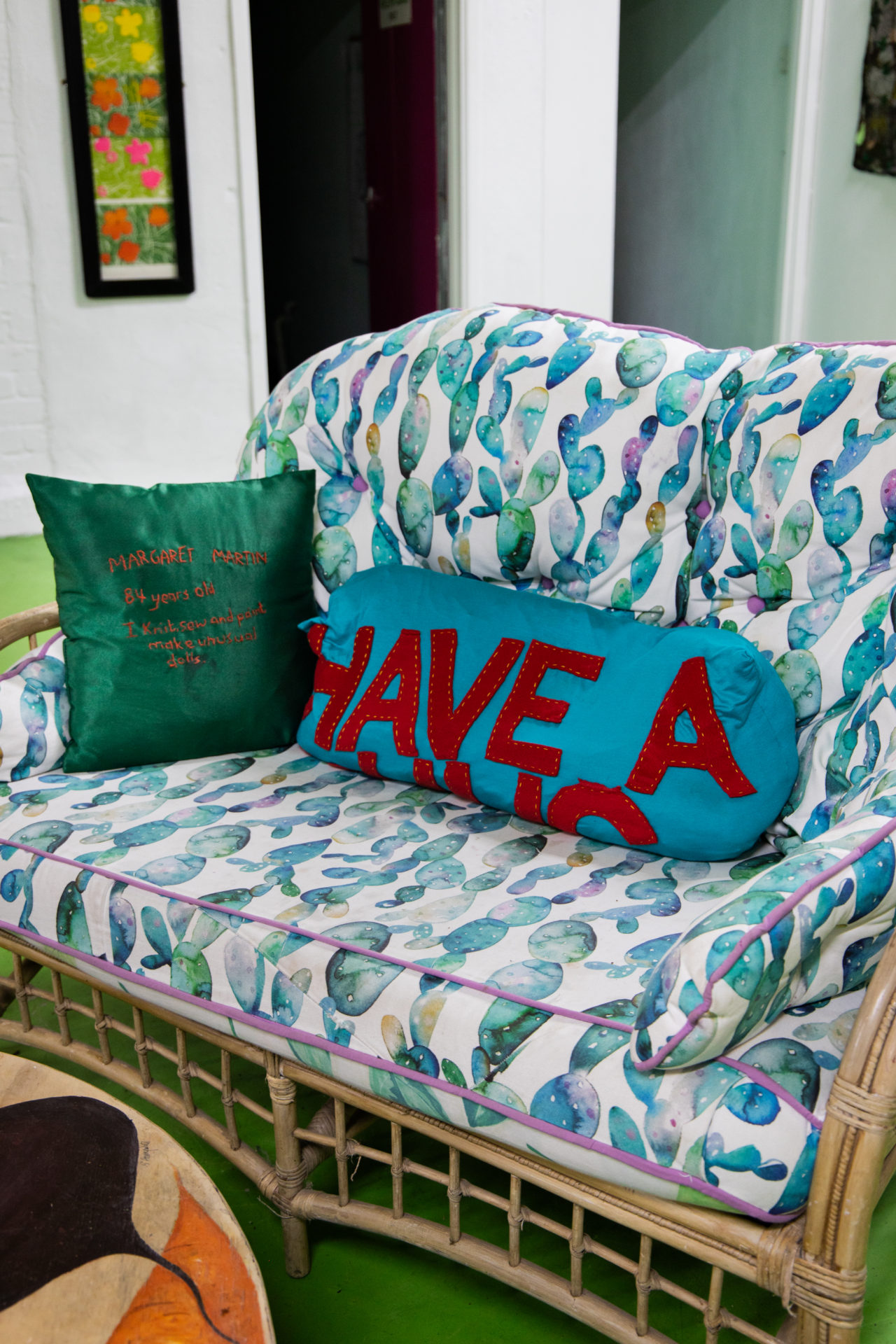
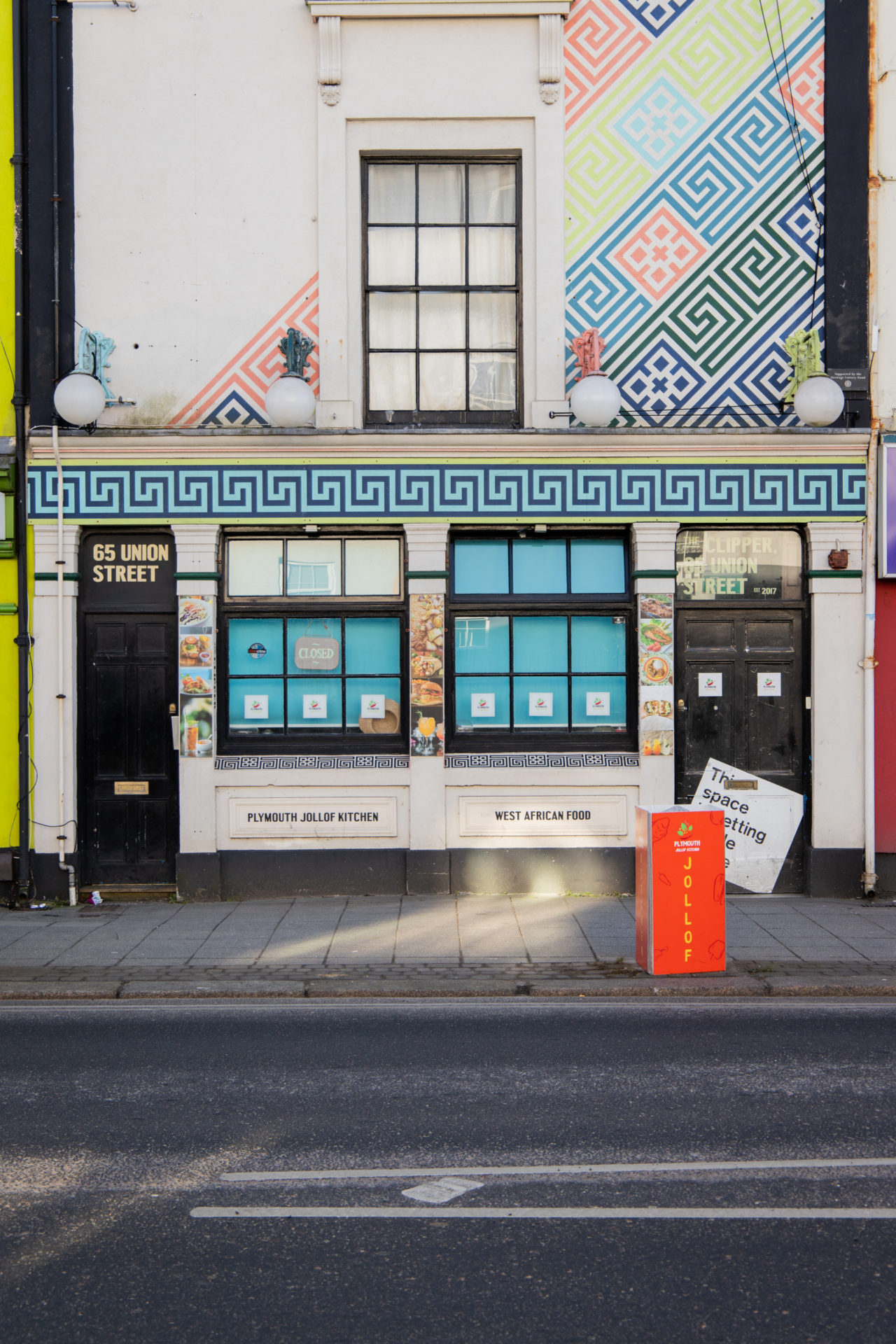
What aspect of Nudge are you most proud of?
The number of times that I hear people walking along the street and say that what is happening has given them hope. It’s the little things that I’ll just overhear where you think oh, my gosh, that’s exactly what we hoped would happen or what we thought we were trying to do.
We can name hundreds of people, if not more, that have had something happen here that has changed something for the better for them, created opportunities that they wouldn’t have had or their ability to make something happen – there are so many things like that. And that is super special.
I mean, obviously the buildings are behind all of that, but actually, they’d be irrelevant if people weren’t benefiting from what we were doing.
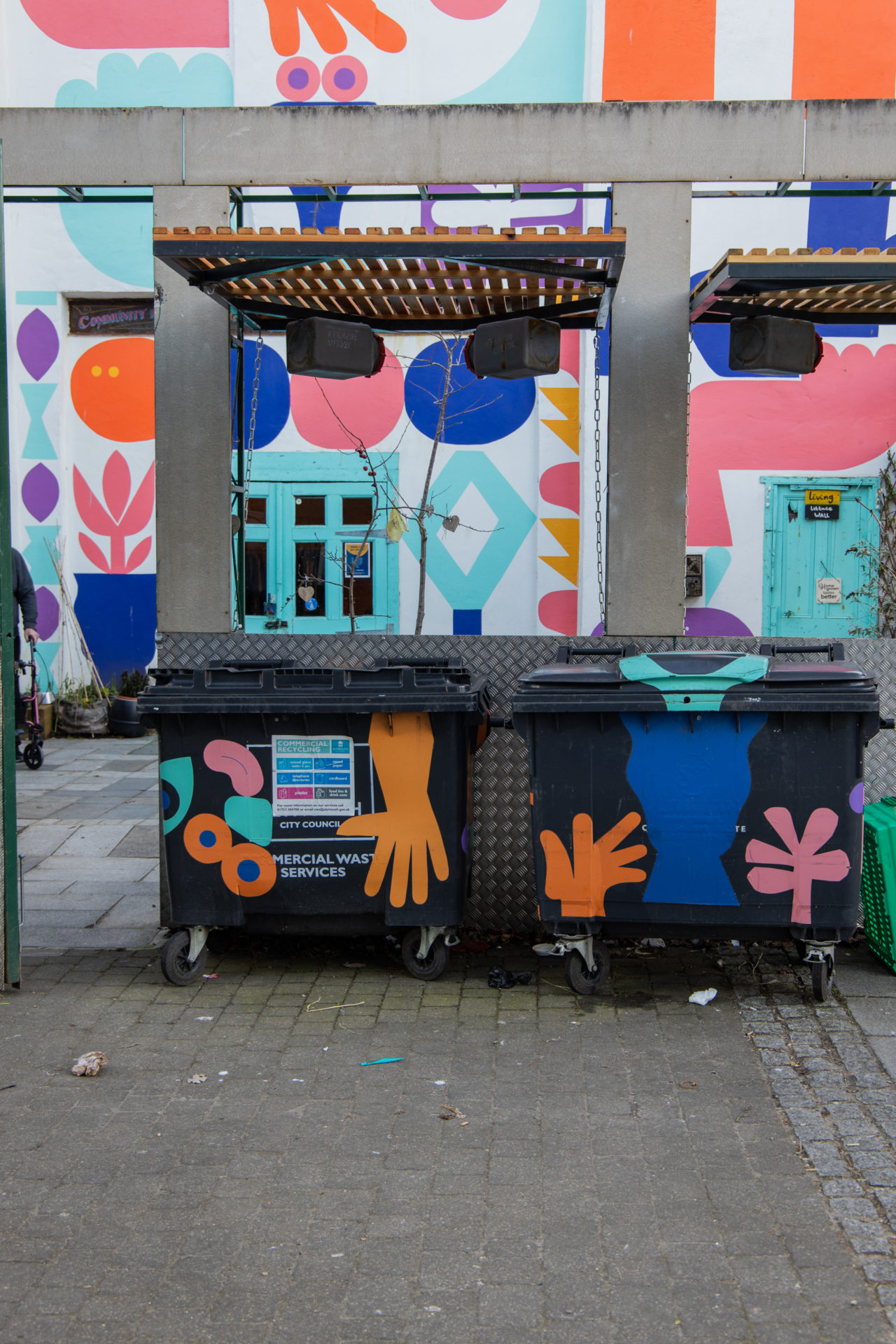
One thing you’d recommend someone to try?
This might sound a bit weird, but I don’t think that we touch things around us enough! I really love to touch buildings and feel them.
So I think it is either just literally touching a space you walk past all the time or making a tiny, tiny change to that space. We have a lack of ownership over our public spaces. I feel like just by picking something up or cleaning a little something or leaving something special or whatever, something like that just engages you with the world around you in a really different way.
I went up the cherry picker for the Millennium building, I just went up to just give it a bit of a stroke at the top. All the professional people thought I was nuts. It feels really funny to share this – I’ve got all these pictures of my hand just touching buildings.
I think that people always look for permission, but It can be the smallest thing that they’ve made or that they’ve done, and they just pop it into the outside world or that they look after the plants and stuff like that. We often think that it’s someone else’s responsibility.
Like when people were painting all the pebbles and stuff like that? It’s like those sorts of things. They have interesting impacts for lots of other people who might see these pebbles, or people that leave books out for others to pick up and read. During the pandemic, I really struggled with Zoom, and so I started to crochet whilst zooming and made these little aliens with messages that I popped along the street and then they all disappeared. I mean, people took them home or whatever, but it was like just that idea of being able to communicate with someone else. A local person made patchwork hearts that went up on Union Corner, those things just make a difference to so many other people.
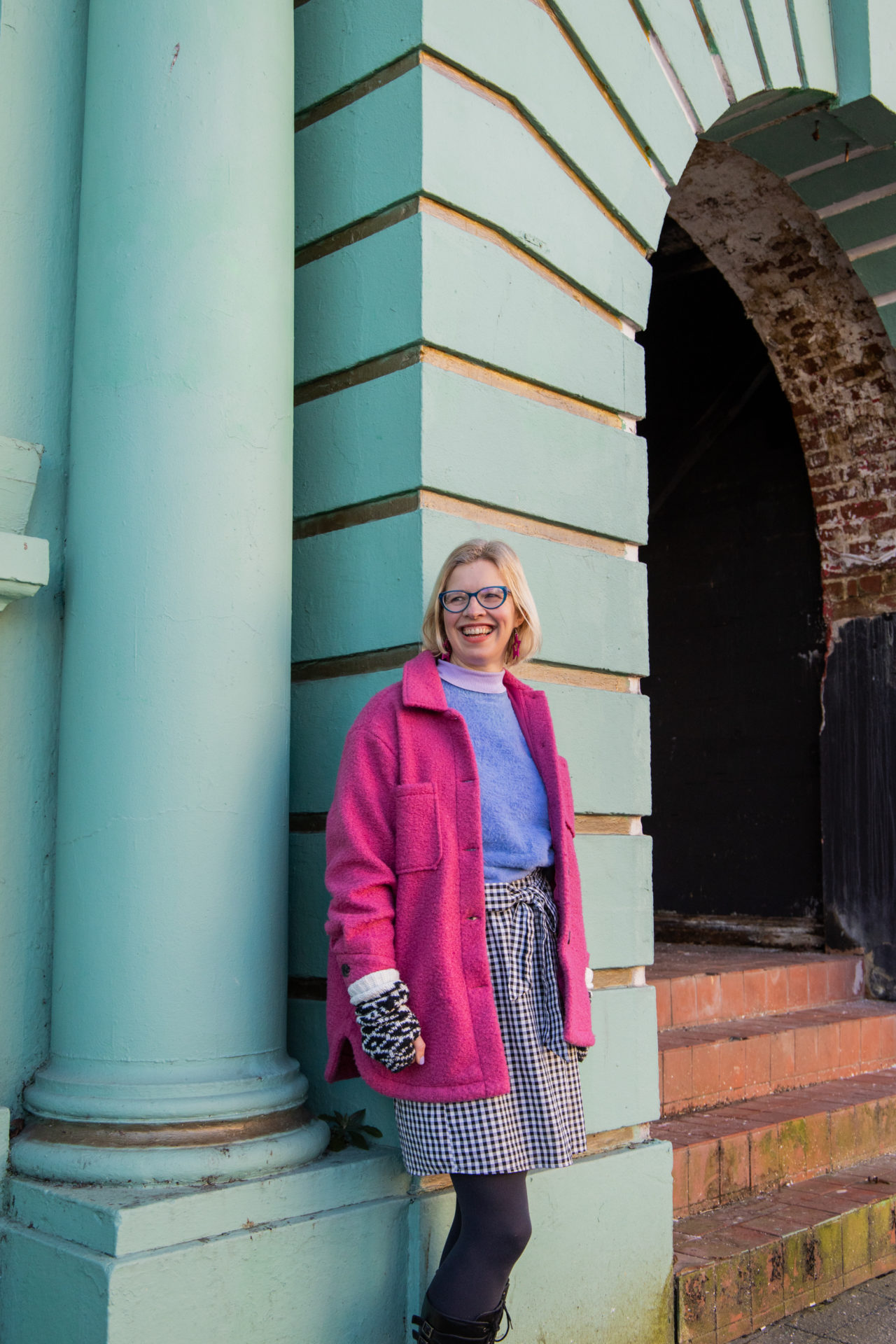
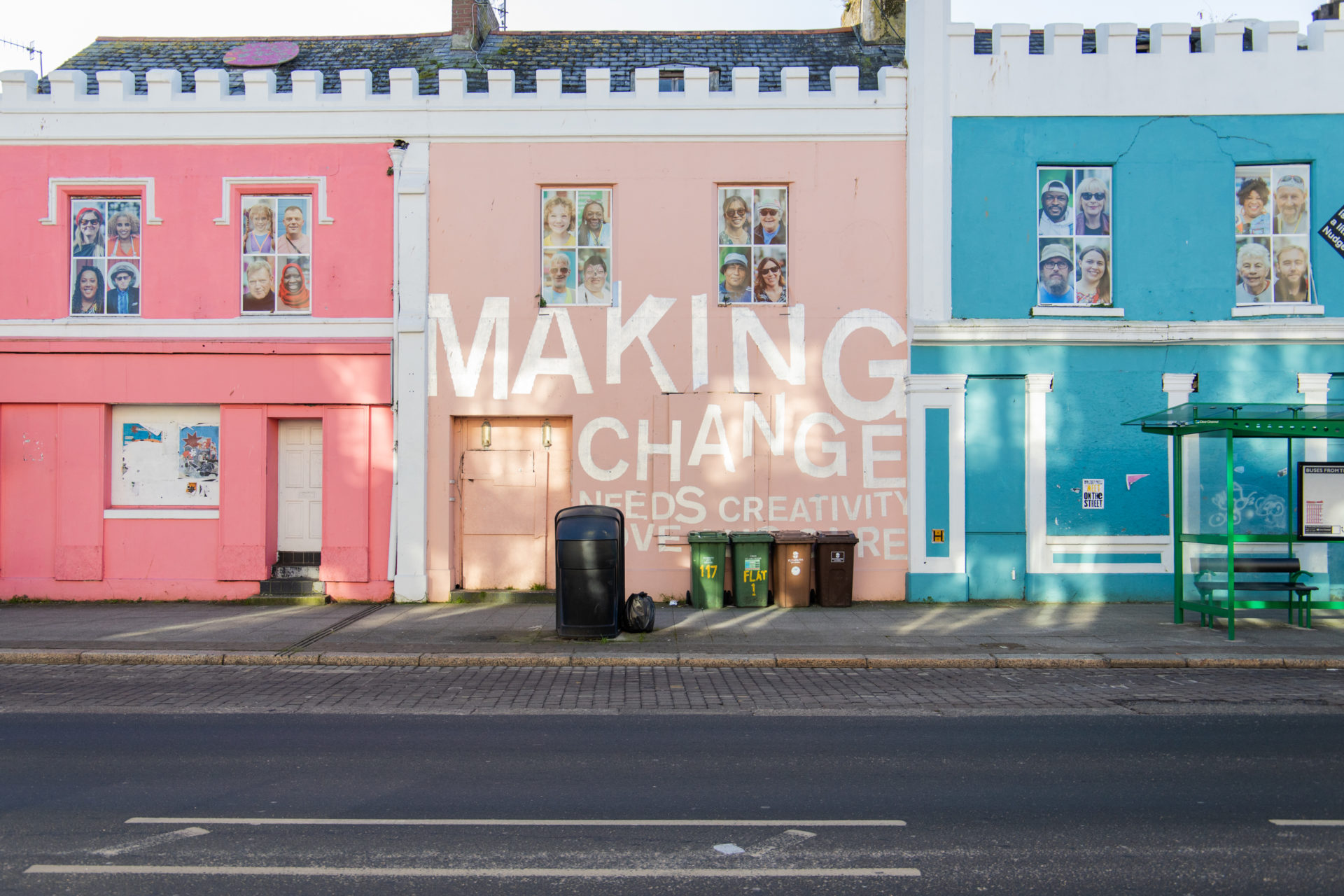
How do you maintain a work life balance?
It’s a life balance, I think, is what I go for, because this is more than work, it comes from the heart. We obviously support people working for Nudge to have a work life balance. But, yeah, for me and Wendy it has definitely come from deeply caring for the change that we see is possible.
The way that I manage my stress is by making things that then quite often come in here in some way. I crocheted the shopping trolley during a community share offer, started off the moss wall at The Plot when it felt like we weren’t getting anywhere. And so those things helped me to switch off, but in a way where you still feel like you’re kind of contributing. I think the hardest thing for us is being so local we are around all the time.
I guess the other thing about the work life balance is that my children have grown up with all this. My daughter has just started walking home from school on her own knowing that she can come in here if she needs help – it’s a community, a support network that helps us all do what we do.
I’m thinking all the time, it doesn’t really matter where you are. The best ideas can sort of drop into your head. The best ideas and funniest things have come out from conversations in the pub or somewhere like that, where you’re just all laughing about something or processing something difficult. I really love spinning off something really tricky that’s happened in a really positive way. Quite a lot of that sort of creativity kind of pops up in the most random places.
I think work life balance isn’t just about time, it’s about how you are feeling and looking after each other. We used to hold a lot. This community had experienced so many promises that hadn’t been delivered, and so we’re always really careful about not wanting to raise people’s expectations and then not being able to deliver. But more and more, we’re starting to sort of share what the reality is like, and people want to be part of it and they want to support in all sorts of different ways.
At our AGM, I’d been keeping notes of really patronising things that people had said to us. I’d just been writing them in the back of my book, not quite knowing what to do with them because they were going in my head and definitely holding us back. In the end we decided to put them all up and it was so empowering – just to firstly just laugh about them and then notice peoples responses. I think the more we’re getting established, I feel there’s more and more responsibility to actually share some of that stuff because the number of people that came up and said, oh, people have said stuff like that to me, but I thought it was just me.
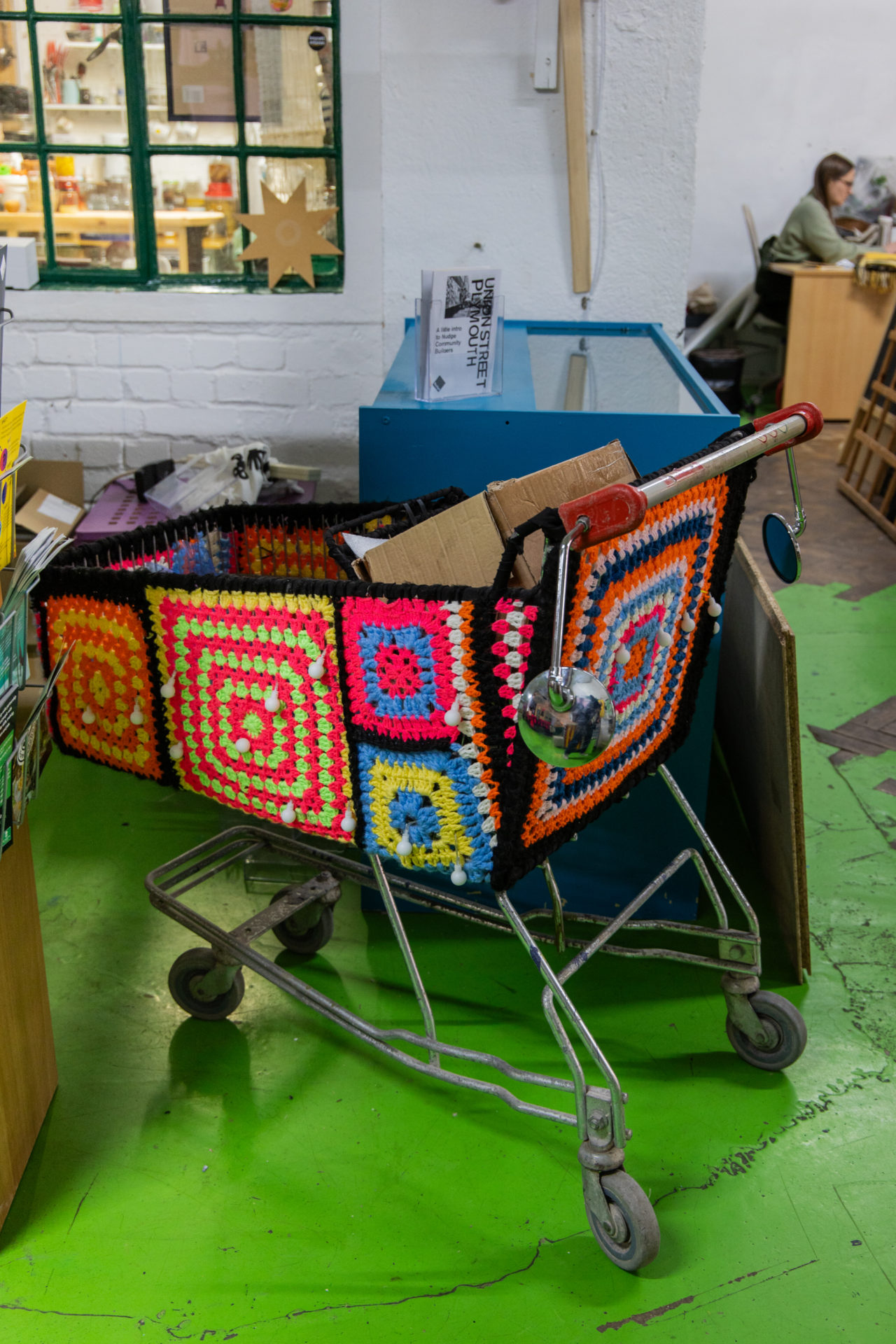
So what have you got in the pipeline for Nudge next?
This year is exciting, I think, trying to get excited about it. Obviously, we want to get the ground floor operational on Millennium and do the next set of Awakening events there as well. Those events are helping us understand how much we need to do and how we can do that and retain the vibe and all the things that are important for people. And so it’s about really understanding what is good enough, where are the bits where we need to invest and what can we actually just leave and just really add to how the space can be and feel and create a different kind of space in the city and stuff.
Then looking after The Clipper and here and Union Corner. At C103 (Tiffs/JFKs), we’ve just had some money to put the glazing and doors in and stuff like that. It’s going to be a mushroom farm and urban farm, and then create some bigger spaces for Precious Plastics who need to scale. So you’ll see a real change to half of C103, at least. The other side, we’re hoping to do some housing on, so we’re just trying to kind of assemble the finance for that.
So a good year for me would be that parts of C103 are open. Ground floor of Millennium is operational. Union Street party in September.
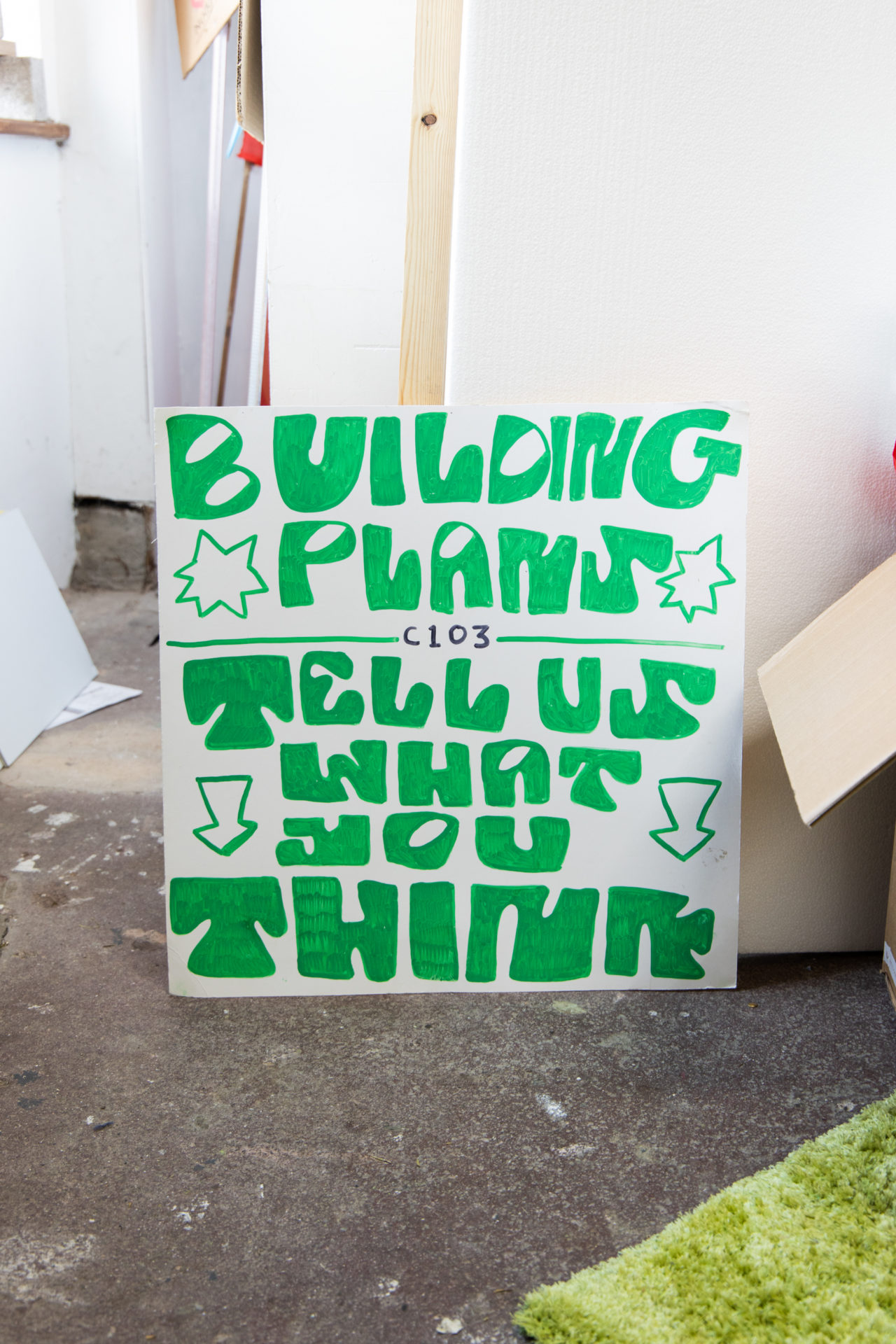
How do you decide on the building names?
Normally one just appears.
Like with Union Corner that just came up when we were doing the garden and someone just mentioned it. And it was like, well, obviously that’s what it’s called on the Corner on Union Street. The Clipper was called the Clipper. Millennium is a weird one because it depends what generation you’re from, how you’d refer to that building. And so Millennium has kind of been the default and we haven’t necessarily gone through a naming. There’s core group of people that are determined to call it The Warehouse, older people remember it as the Majestic.
Then this one we called The Plot, because we were losing the plot in the process of doing it! We’d already sort of talked about it being kind of sheds and greenhouses and stuff, so it kind of fitted with that whole vibe that we wanted to do.
Still waiting for C103 – we’ve gone back through all of the old names but nothing has stuck yet.
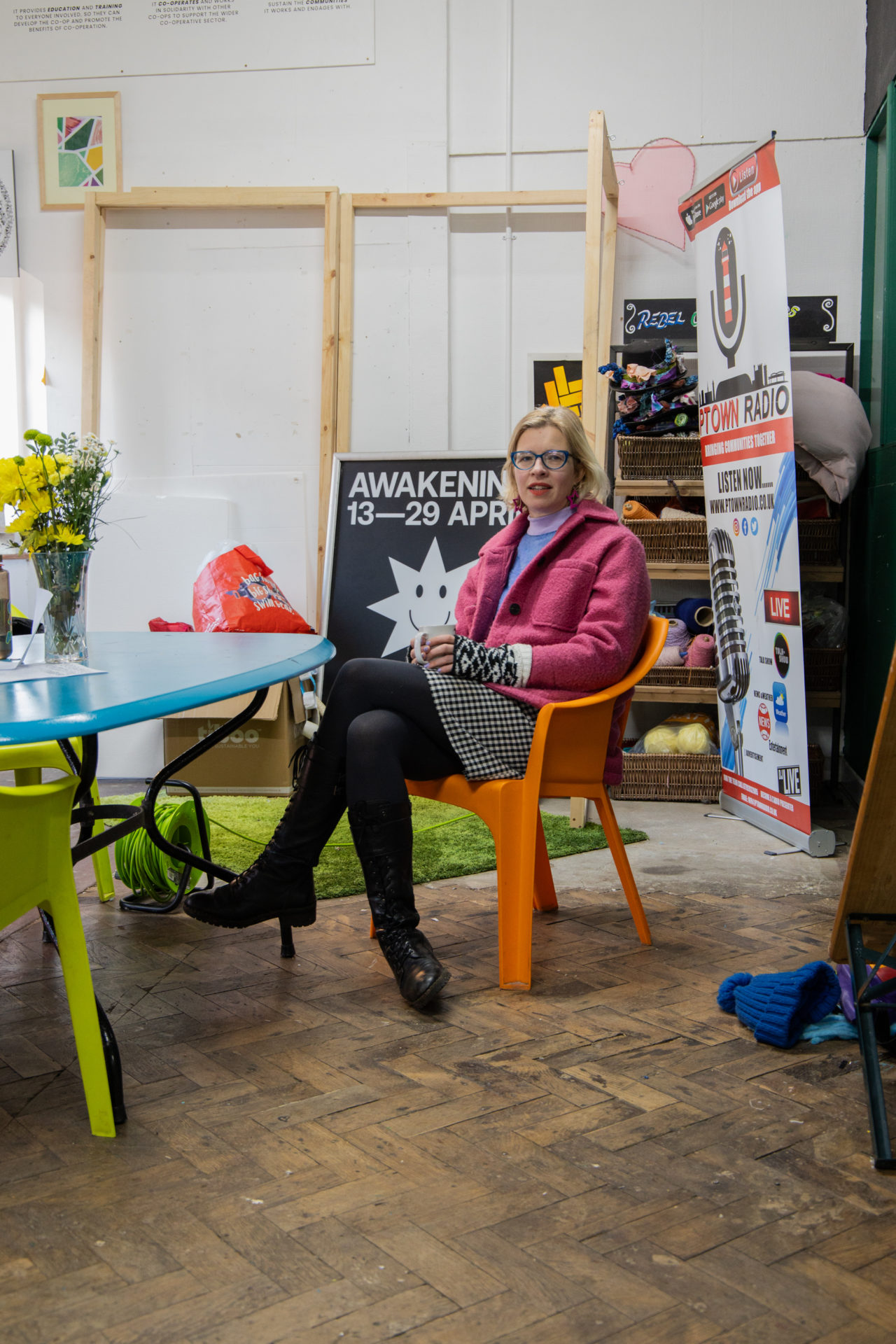
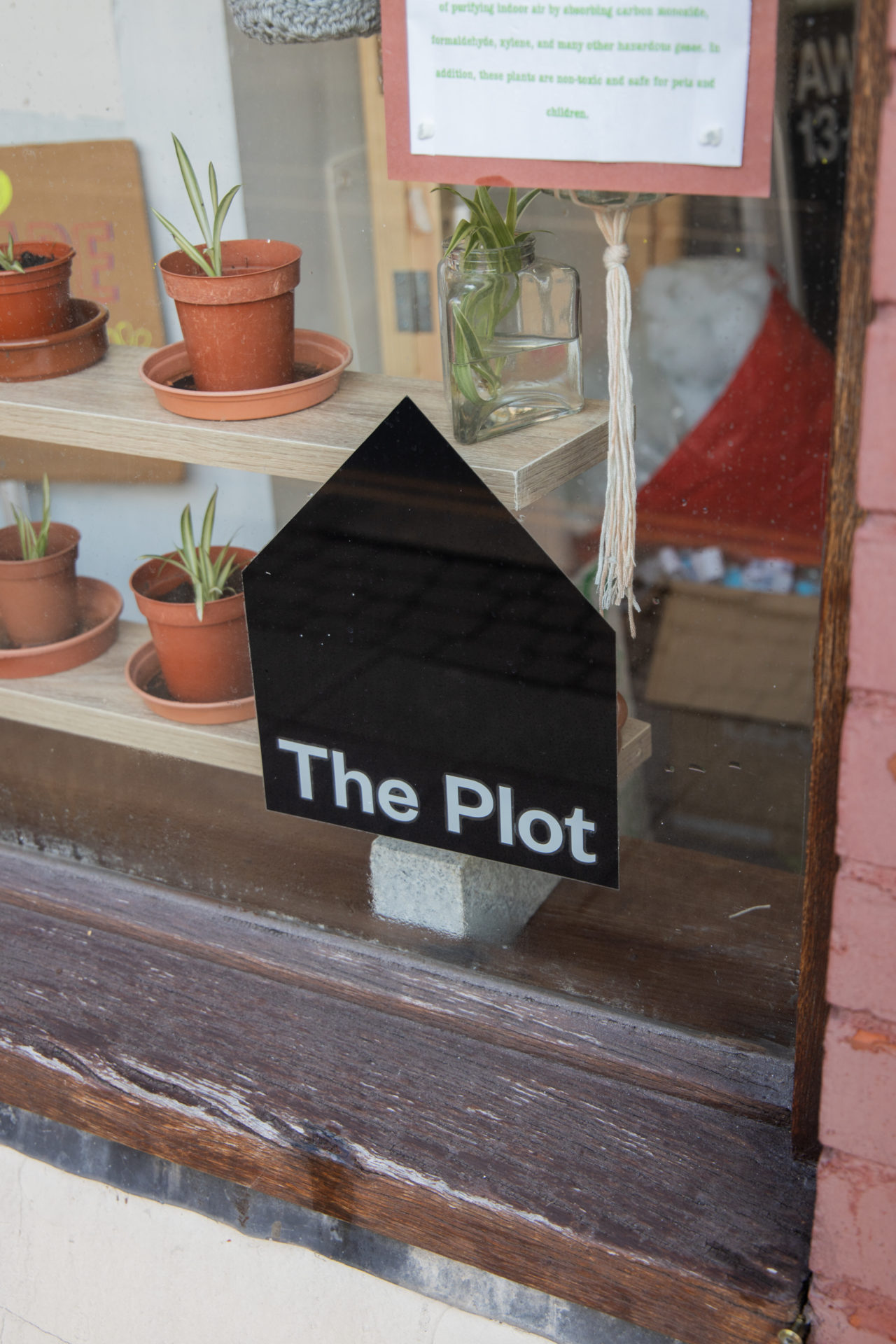
Playlist or podcast?
Definitely a podcast.
I’m quite liking the podcast that Holly Tucker’s doing, who created Not On The High Street – Conversations of inspiration. That’s really good in terms of people’s business experience and the reality behind that. And Spinning Plates with Sophie Ellis Bexter. Anything that makes me feel a bit more normal, really, that’s what I listen to when I’m sewing or making.
I never thought that I would be so into economics, but the more that we do, and the more different kinds of financial things that we’re unpicking, the more I’m interested in the economy and how it can be different. Podcasts are good way to learn more about these kind of issues.
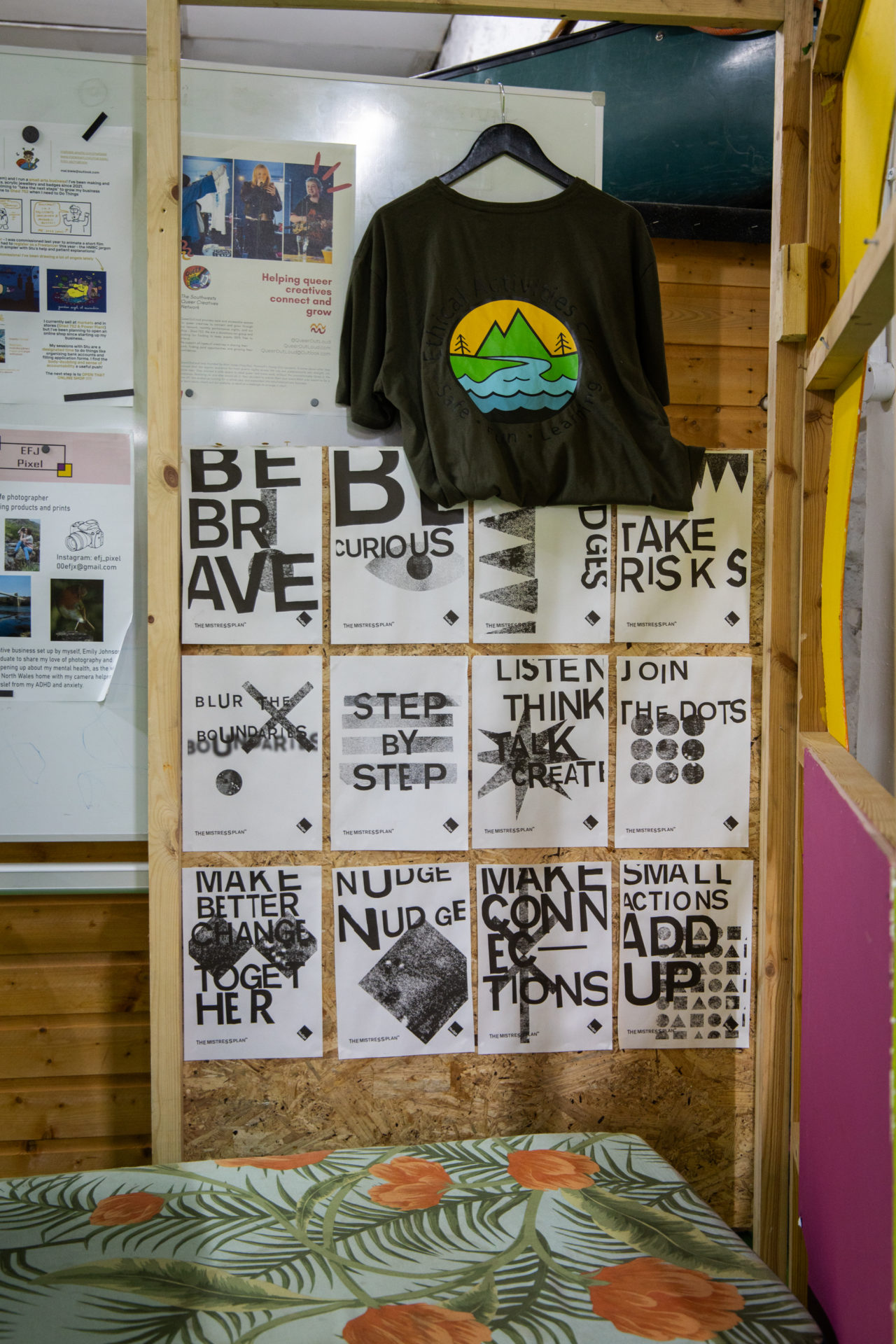
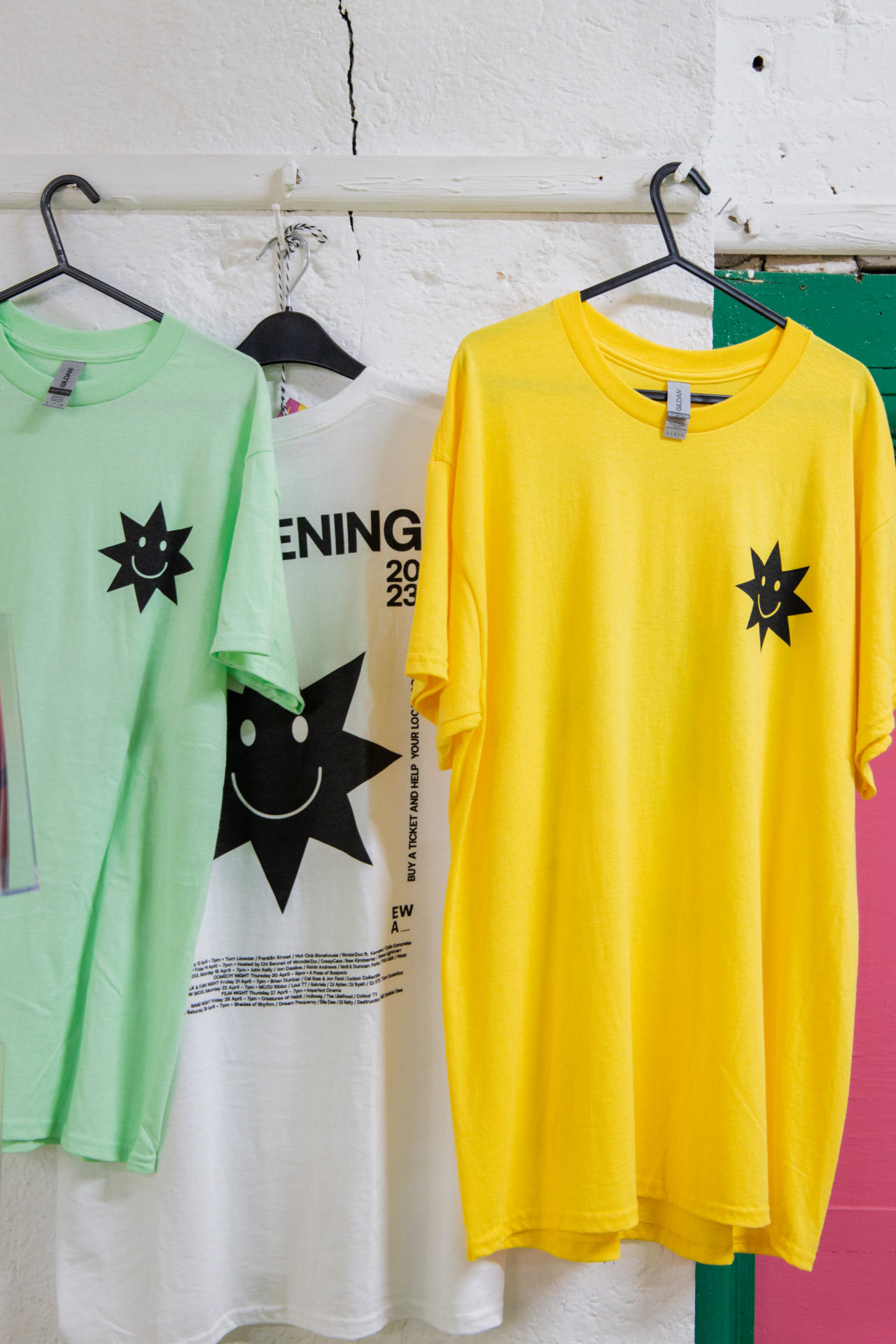
How do you deal with issues like gentrification?
That’s why the ownership of buildings is so important. So the buildings we own, we know we can control who uses them and who benefits. It might happen around us though.
We’ve got 595 investors, and some of those people are people that want to see that change. I think for the majority of people, they don’t question what good change looks and feels like. On the face of it, gentrification can look like a positive thing. And I think there’s a large amount of people that would see it that way. But often the community that have lived there for years and could benefit most miss out. So we want to show why having a different way that benefits people that need it most is also possible.
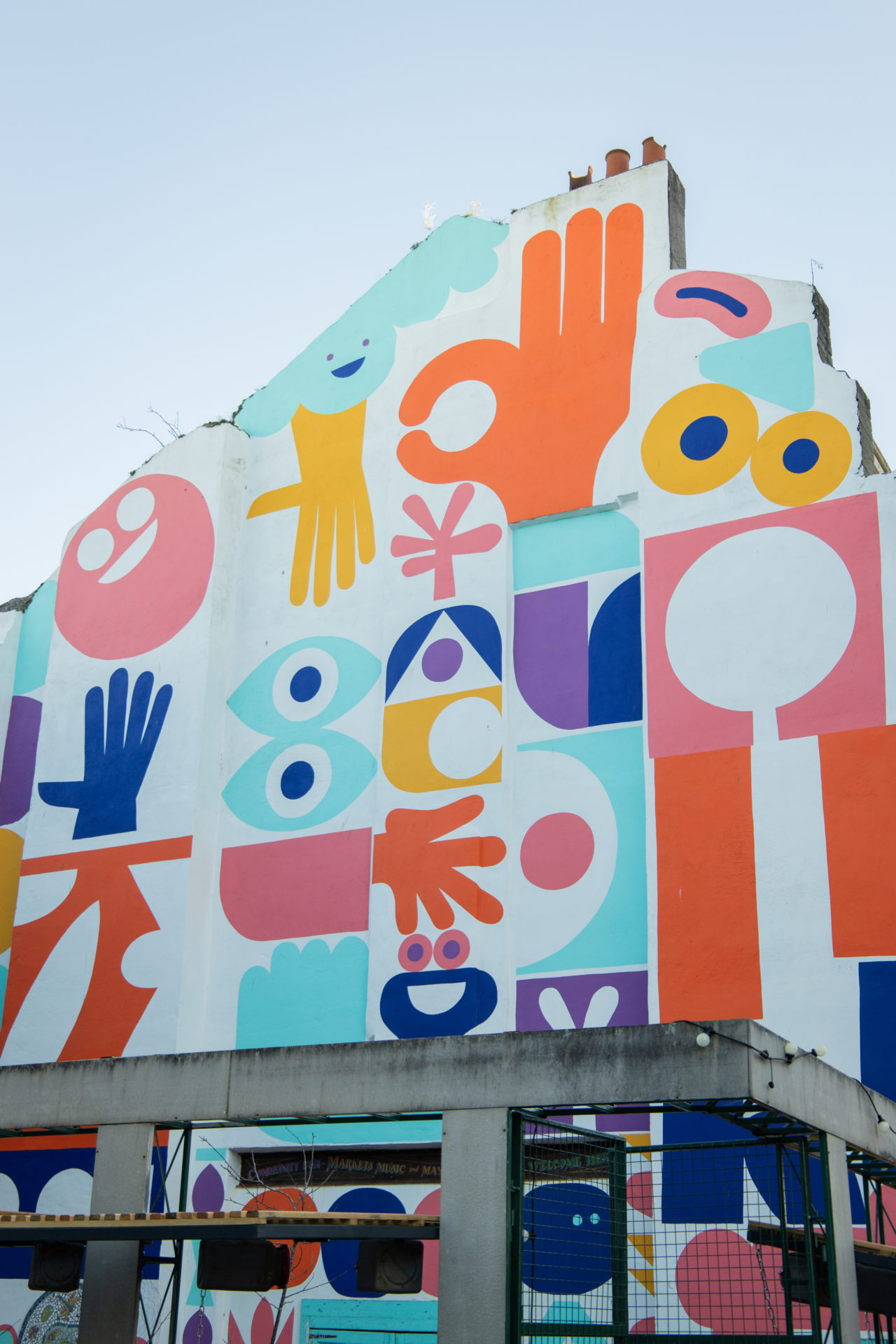
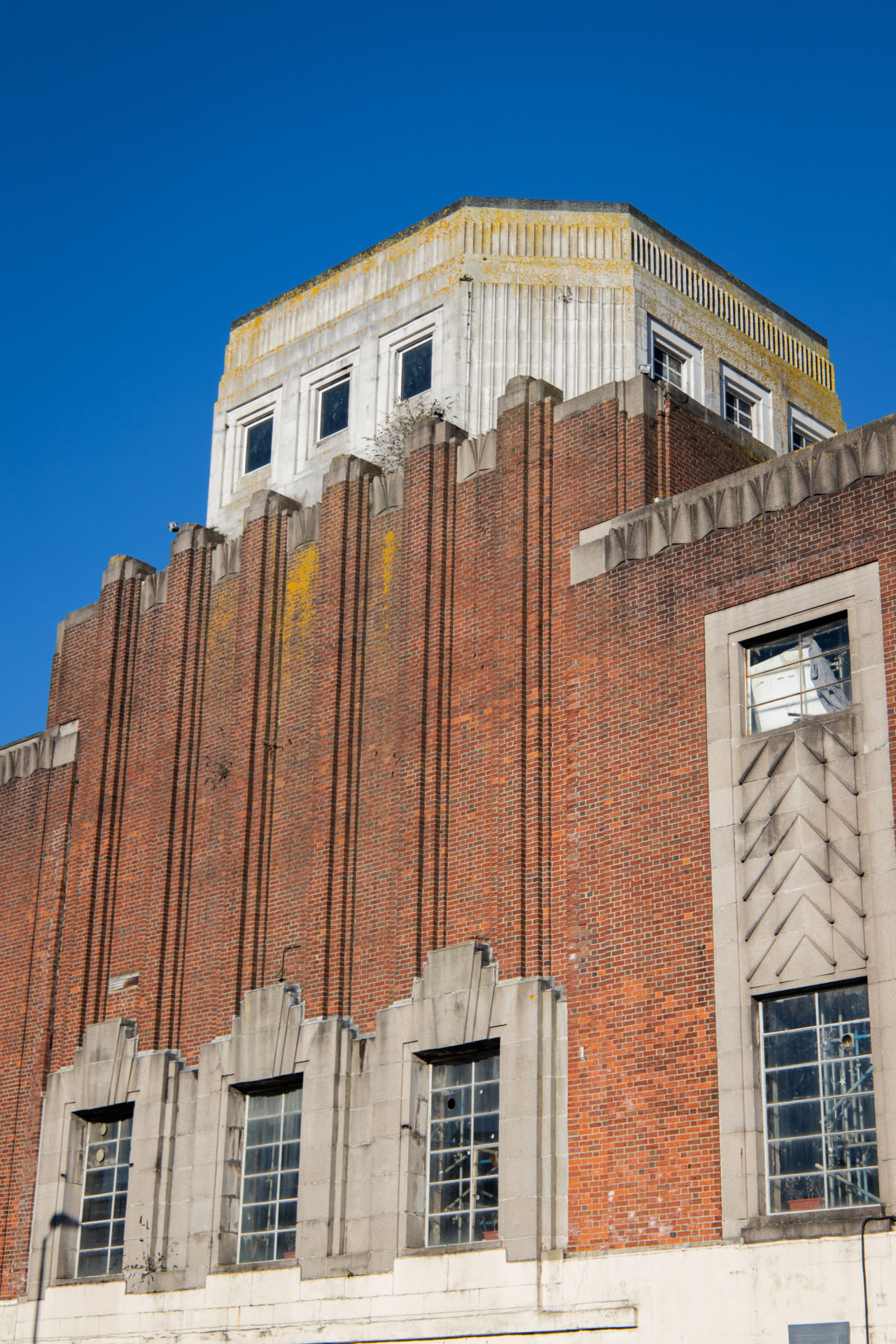
Any advice for people looking to get involved in their local community?
I think it’s rocking up to some things and finding what sparks your interest, giving some things a go and maybe trying some things that you might feel a bit uncomfortable turning up to or think you are not sure about – they may surprise you.
We get lots of people coming in with ideas and wanting to do stuff and then never actually taking it to the next step. And we’ve always said, that next step can be the tiniest thing, just to test something out. We started the Street Party by buying some bags of shopping and some stuff from the scrap store and sitting on the corner on a street and it didn’t need anything more than that. Starting small can just lead to a lot more than you ever imagined. We never imagined we’d be doing all this.
And the championing is also really important. So if you haven’t got the capacity to actually do things, just really championing what’s already happening is also really valuable. The normal news often focuses on the negative. We miss out on all the amazing things that are happening that are not considered newsworthy. So share the good things!
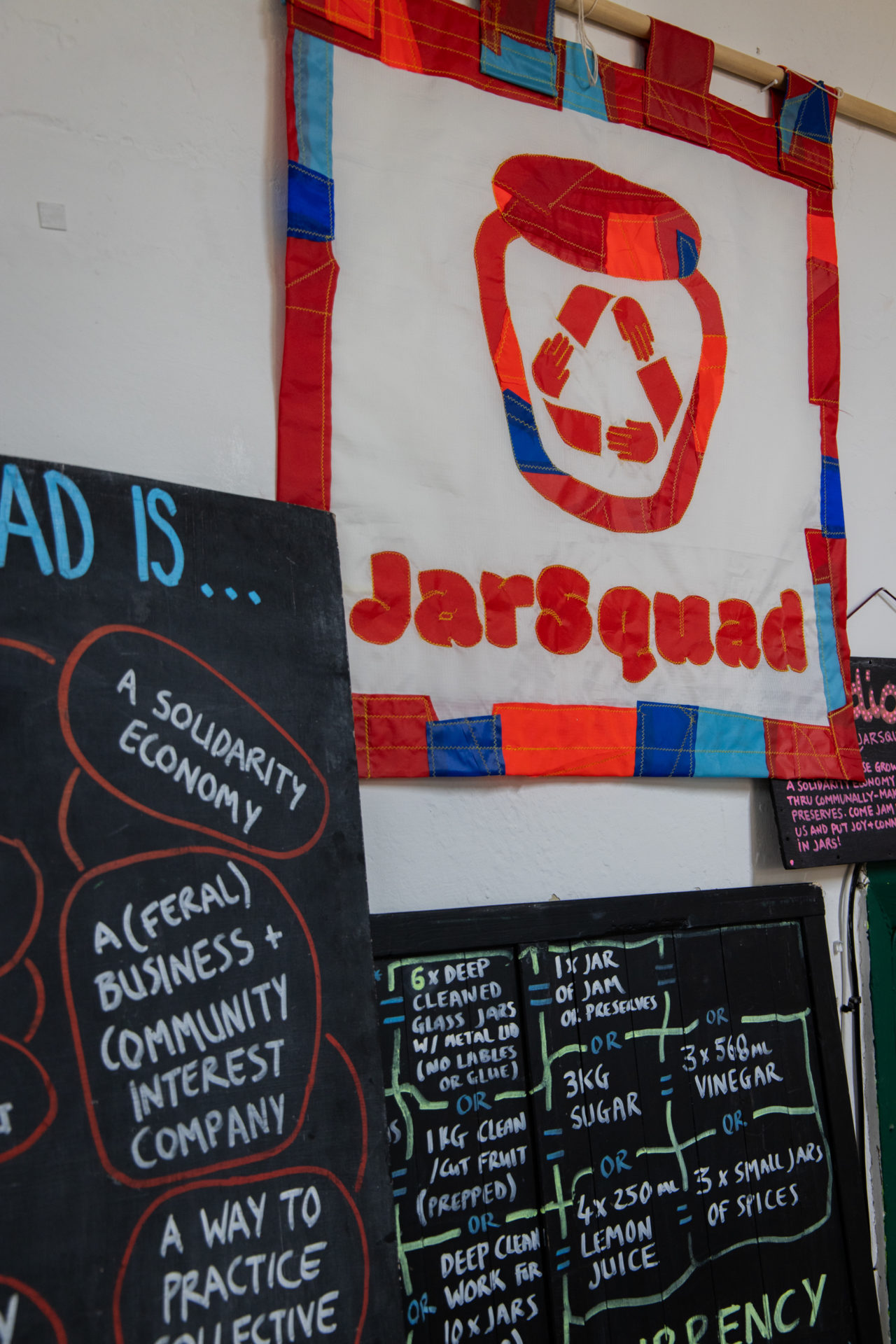
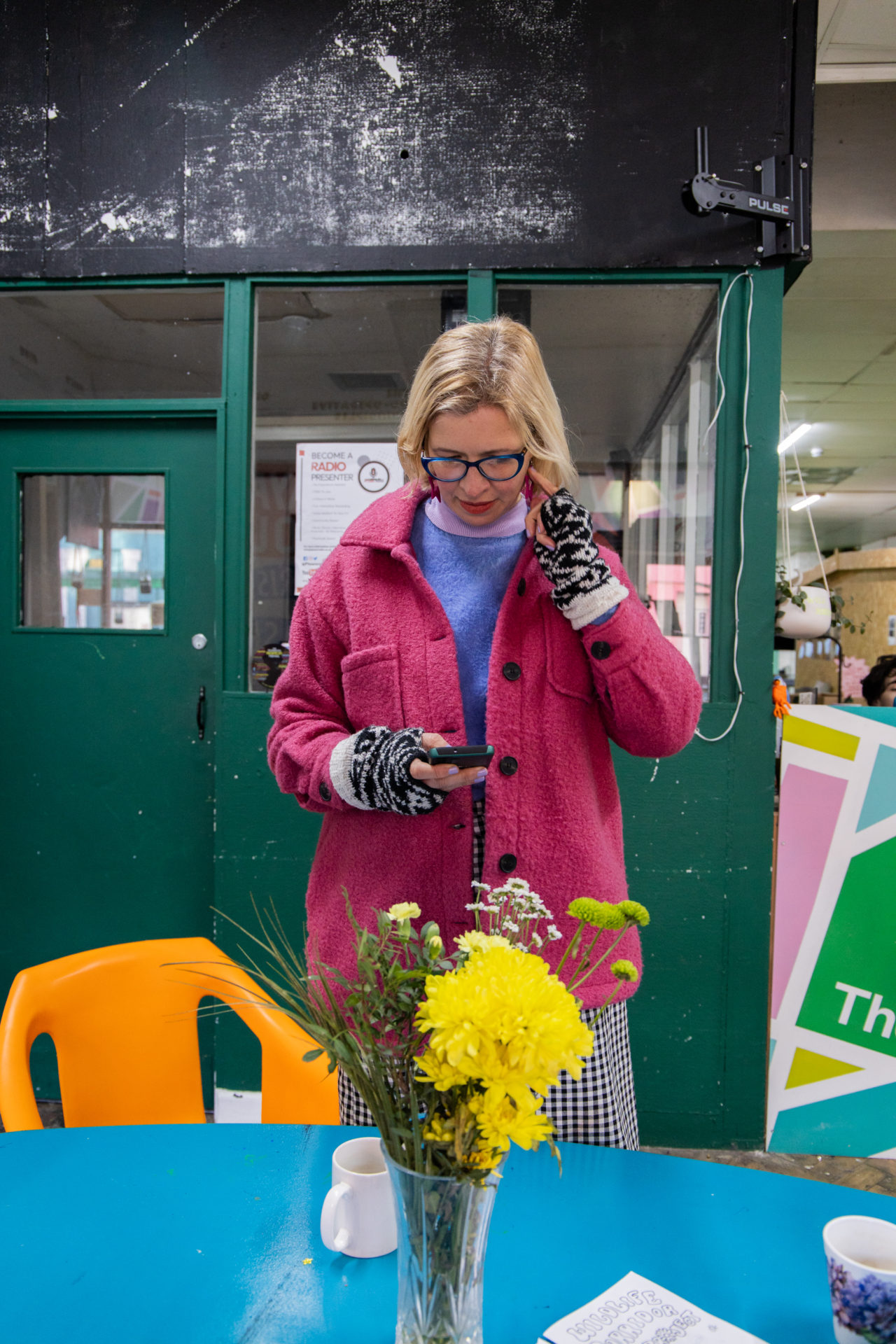
What keeps you in Plymouth?
When I first met my husband, he said he wouldn’t travel more than an hour for me! No seriously, my parents are from Plymouth – they met in the Millennium. We moved around a lot when I was growing up because my dad was an apprentice in the dockyard and then worked on oil rigs. So I was born in Aberdeen and then we lived in Holland for a while and then moved back, I think it is why I like change. We’d always come down here to see my grandparents though and then I moved back to work at the museum.
It’s a city that is big enough to have exciting things happen, but small enough to make a difference. I love all of the different connections and possibilities. I think there is a really supportive environment here with lots of people wanting to help make it a great place to live.
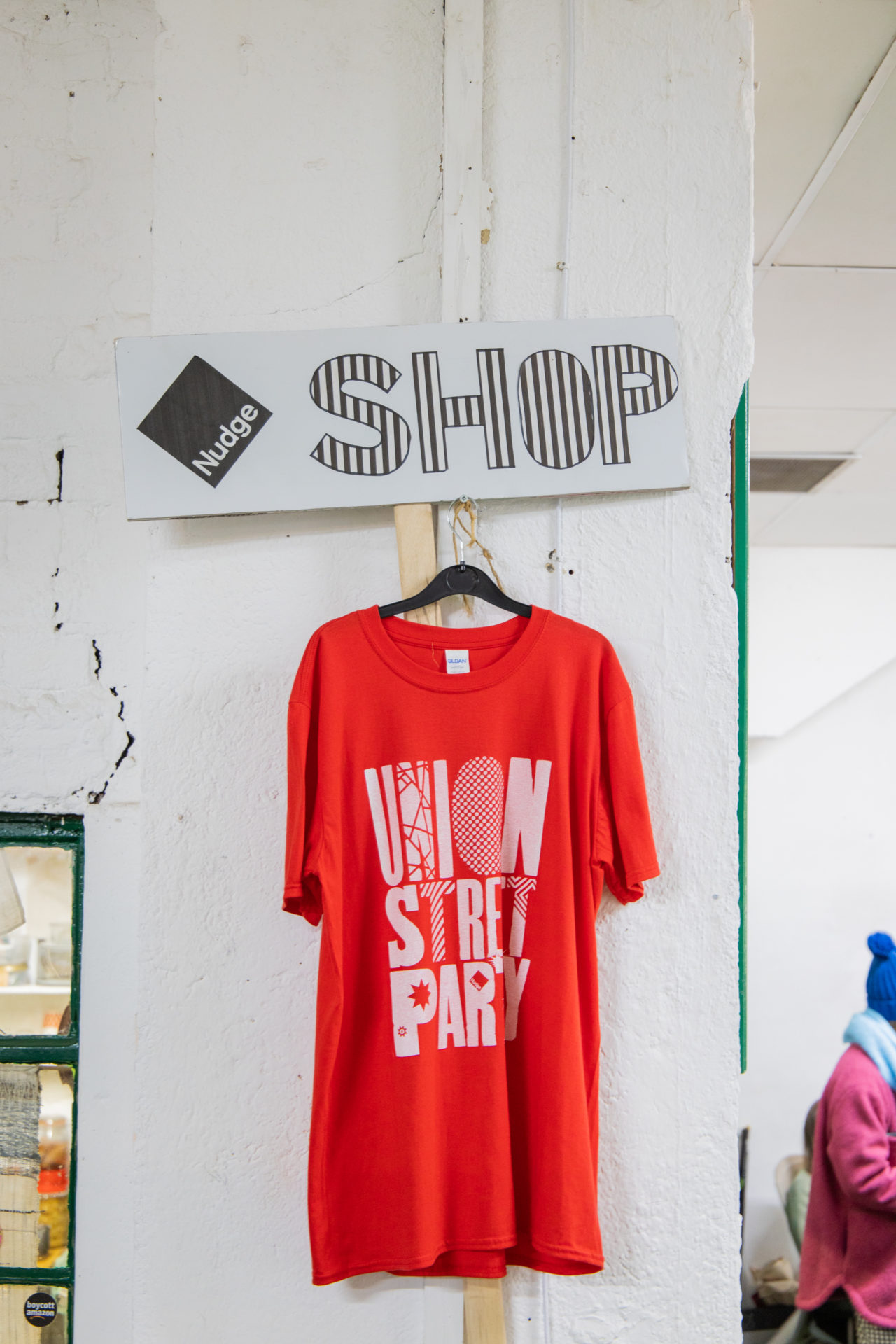
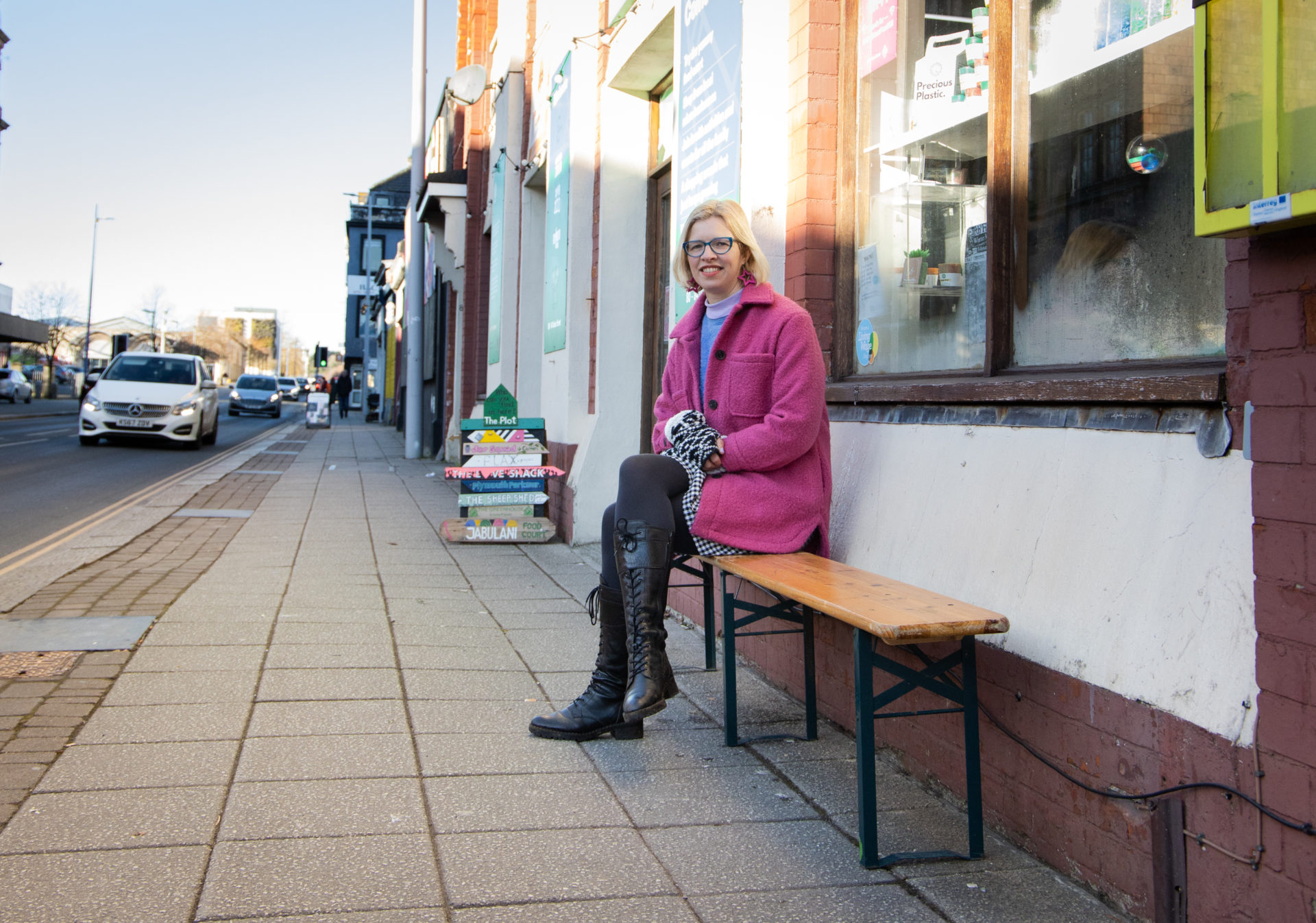
Check out Nudge:
Website > https://www.nudge.community/
Instagram > https://www.instagram.com/nudgecommunity/
—
If you’d like to feature on our HEY Series please let us know. Get in touch here.